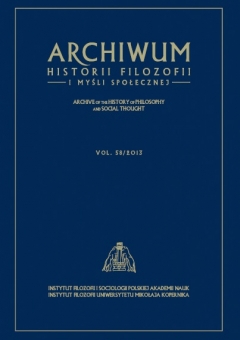Ontologiczne założenia Platońskiej teorii idei w ujęciu Hermanna Lotzego
Ontological Assumptions of Plato’s Theory of Ideas according to Hermann Lotze
Author(s): Wojciech HanuszkiewiczSubject(s): Semiology, Logic, Ontology
Published by: Instytut Filozofii i Socjologii Polskiej Akademii Nauk
Keywords: Hermann Lotze; Plato; ideas; intentionality; semantic inferentialism; non-conceptual content; critique of psychologism;
Summary/Abstract: New approach to ontological status of Plato’s ideas is one of the most important achievements of Hermann Lotze. In his Logic (1874) Lotze argues that ideas have not existence (being) but are valid as predicates in propositions. h e key concept in this line of thought is validity (Geltung) that expresses one of the modi of reality (Wrklichkeitsweise). Analysis of its ontological assumptions allows introducing a model of intentionality which combines semantic inferentialism of conceptual contents with non-conceptual determination of the limits of language expression and its rationality.
Journal: Archiwum Historii Filozofii i Myśli Społecznej
- Issue Year: 58/2013
- Issue No: 58
- Page Range: 195-212
- Page Count: 18
- Language: Polish

